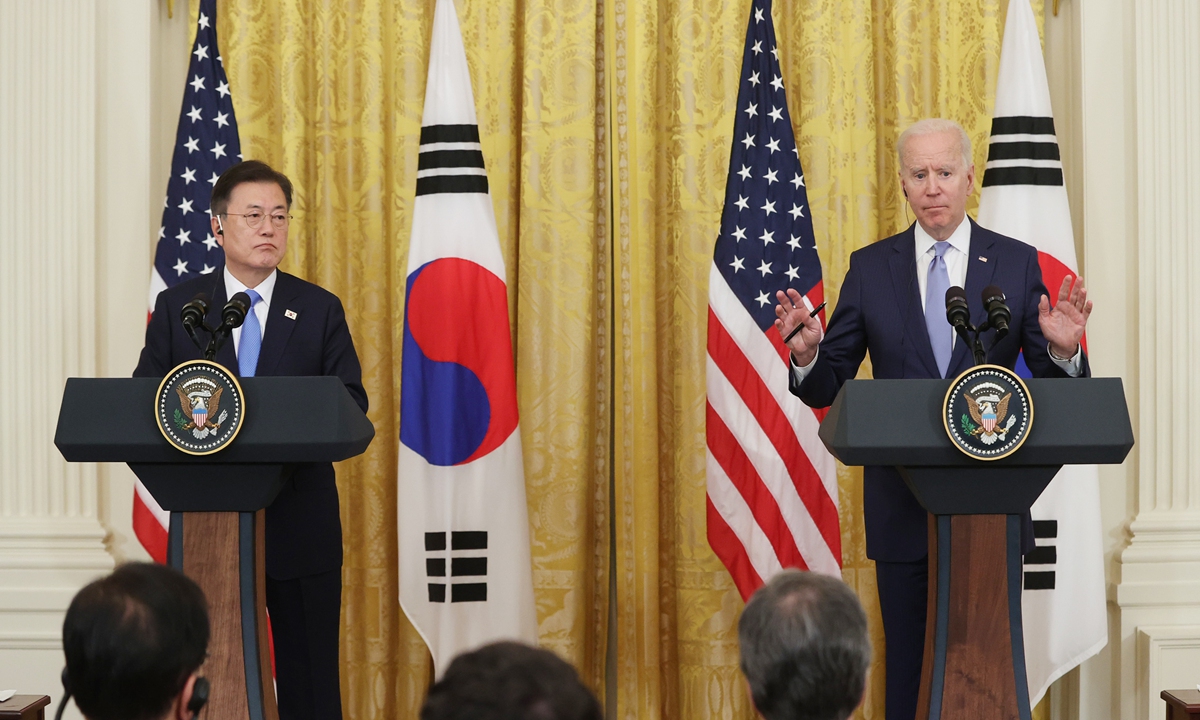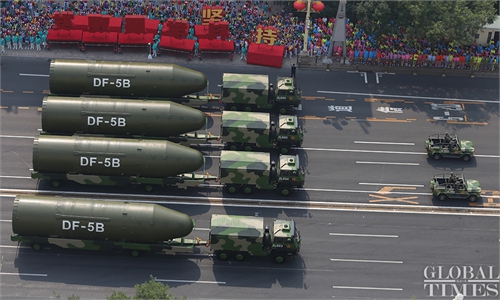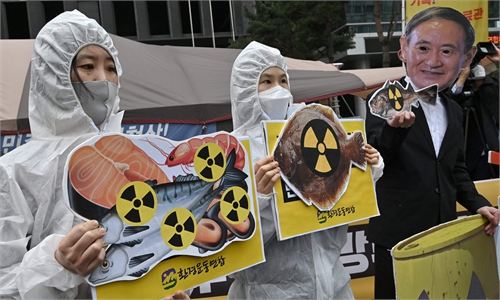
US President Joe Biden (right) and South Korean President Moon Jae-in participate in a press conference in the East Room of the White House in Washington, DC on May 21. Photo: VCG
The Korean Peninsula situation is at a crossroad and more efforts should be made to ease tensions on the Korean Peninsula and resume dialogues, Chinese experts said amid the visit of a veteran US official to South Korea on nuclear talks.
Chinese experts believe positive results are expected from the visit as the Biden administration has worked to formulate a new approach on North Korea that is believed to be more "flexible" and North Korean leader Kim Jong-un signaled willingness to have talks.
Sung Kim, US special envoy for North Korea, arrived in Seoul on Saturday and will have talks with Noh Kyu-duk, South Korea's special representative for Korean Peninsula peace and security affairs on Monday.
On the same day, the two along with Takehiro Funakoshi, head of the Japanese Foreign Ministry's Asian and Oceanian Affairs Bureau will have a trilateral meeting on nuclear talks, according to the Japan Times. This is his first visit to South Korea since being appointed to the post.
Later on Tuesday, Sung Kim will meet with Seoul's Unification Minister Lee In-young and members of academia and civil society to discuss the outcome of Washington's North Korean policy review before leaving the country on Wednesday, KBS reported on Saturday.
Sung Kim's five-day visit to South Korea comes as the administration of US President Joe Biden has finished a review of its policy on North Korea in April and North Korea made gestures for the first time since Biden took office that it is willing to resume nuclear talks, according to media reports.
This trilateral meeting is part of the Biden administration's broader plan of coordinating with every possible nation to reach the goal of complete denuclearization of the Korean Peninsula, Yang Xiyu, a senior research fellow at the China Institute of International Studies, told the Global Times on Sunday.
Contrary to the Trump administration's strategy of fighting alone, the Biden administration is willing to coordinate with its allies and countries including the European Union, NATO, Russia and China or use the coordination mechanism under the UN framework to solve the issue, Yang said.
Kim Jong-un and Trump met three times in 2018 and 2019, but failed to reach any tangible result in denuclearization in the Korean Peninsula.
Different from the Trump administration on denuclearization of the Korean Peninsula, the Biden administration is taking a more flexible strategy - while it imposes high pressure against North Korea, it will adjust its policies in accordance with North Korean moves. "If North Korea goes soft on issues on denuclearization of the Korean Peninsula, the US would go softer; if North Korea gets tough, the US will go tougher," Yang said.
"The Korean Peninsula situation is at a crossroad as the Biden administration has worked to formulate a new approach on North Korea and Kim Jong-un is adjusting his policy in dealing with the US," Yang said.
Days earlier, Kim Jong-un said that North Korea will prepare for both diplomacy and confrontation with the US during the Third Plenary Session of the 8th Central Committee of the Workers' Party of Korea (WPK) on Thursday, which was widely interpreted as a sign of North Korea's willingness to resume nuclear talks after Biden took office.
To safeguard national dignity and the interests of independent development, and a peaceful environment and national security, Kim Jong-un said North Korea must be prepared for both "dialogue and confrontation," according to the Korean Central News Agency.
Yang said Kim Jong-un's comments represent a shift from previous total refusals to participate in any talks to one of diplomacy and confrontation, indicating that North Korea is open to dialogue with the Biden administration.
The meeting outlined a principle that North Korea is dedicated to breaking its political isolation and lifting itself out of economic sanctions, especially when North Korea domestically has sealed itself off since the COVID-19 epidemic began, Lü Chao, a research fellow at the Liaoning Academy of Social Sciences, told the Global Times on Sunday.
"The attitude shift means North Korea is open to tentative contact with the US and is eyeing efforts by the US to resume talks, but no sign is showing the country is anywhere close to accepting complete denuclearization," Lü said.
In May, Biden admitted that he was "under no illusions" about the difficulty of getting North Korea to give up its nuclear arsenal after his predecessors failed.
Biden said he and South Korean President Moon Jae-in shared a willingness to engage diplomatically with North Korea and to take pragmatic steps to alleviate tensions, according to Reuters.
Chinese experts noted that military drills between the US and South Korea this August will be a critical moment to watch for possible signs of easing regional tension and a step closer to resumption of US-North Korea talks. The atmosphere inevitably becomes more tense at these times.
"As a Korean American, Sung Kim was a long-time US representative for the Six-Party Talks, so he could be said to be a 'connoisseur' in Peninsula issues. The Biden administration is hopeful about the breakthrough that Sung Kim will bring for the goal of denuclearization of the Korean Peninsula," Lü said.
Positive results are expected during Sung Kim's visit. Sung Kim is likely to discuss with the US plans for North Korea with South Korea and Japan and ask coordination from the two countries. Given the common stance that South Korea, Japan and the US share, coordination on North Korea issues would be easy to reach, Chinese experts said.
Yang believes that the resumption of US-North Korea talks would not be difficult given the Biden administration's flexibility and an attitude shift from North Korea, but keeping the dialogue on track and preventing it from stalling as happened in the past will be challenging.
For China, Lü noted that it hopes that Sung Kim would use his considerable expertise in dealing with Peninsula issues to arrive at new approaches to make contact with North Korea, such as expanding the US-North Korea talks to the four sides or six sides talking mechanism, or resume the Six-Party Talks.
Talks participated in by multiple countries such as China, Russia or Japan could play a positive role in coordinating, mediating and prompting talks, Lü said.
"A multi-party mechanism might be a good way to break the deadlock in the US-North Korea talks, which has been stalled since 2019," Lü said.




